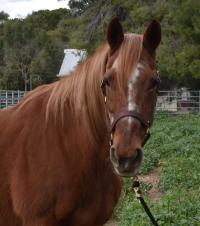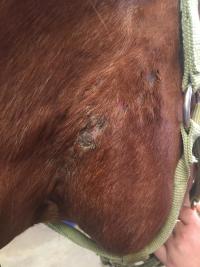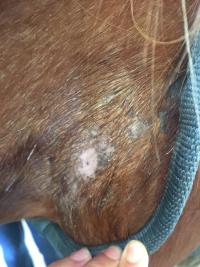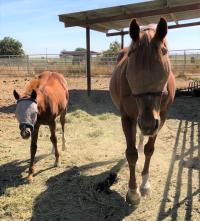CEH Teaching Herd Horse’s Battle with Insect Hypersensitivity

The incredible horses that comprise the Center for Equine Health teaching herd spend their second careers teaching veterinary students and residents and contributing to CEH’s efforts to advance health for all horses. They provide opportunities for students to see a variety of equine conditions firsthand, including equine skin allergies.

Beloved long-time herd member Achilles, a Thoroughbred gelding, was a successful racehorse with 22 starts and more than $200,000 in career earnings. His athletic career was cut short due to a spiral fracture in his left front cannon bone. He was donated to CEH in 2002, and has served as a blood donor for patients at the UC Davis veterinary hospital in addition to his teaching duties. At 26-years-young, he still does some teaching, but he has also turned out to be a star babysitter for our weanlings.
In 2018, Achilles suddenly developed crusty, ulcerative skin lesions on multiple parts of his body, along with hives on his left shoulder and abdomen. He was 23 years old at the time and had no known history of allergic reactions.
The punch biopsy culture of one of the skin lesions did not grow any microorganisms, but further testing revealed high levels of eosinophils, specialized white blood cells that play a role in the body’s immune response, indicating an allergic reaction. The resulting diagnosis was eosinophilic dermatitis. A fly-bite hypersensitivity reaction was suspected as the cause, and Achilles was treated with an oral antihistamine and bathed daily with antifungal/antimicrobial shampoo. His skin lesions steadily improved. He had a relapse of hives a few weeks later, but another course of treatment resolved his clinical signs.


Biting insects such as flies, midges, and others can cause hypersensitivity reactions in some horses. Although horses from any breed can be affected, increased susceptibility in certain breeds suggests a genetic component in addition to environmental factors.
Attempts to prevent these types of allergic reactions mainly involve reducing insect exposure, which can be challenging.
Achilles has recovered fully and has not had any further related incidences. Our staff monitor him closely, and he is no stranger to fly masks and fly spray, especially during the summer months.
